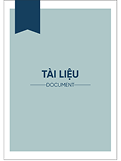Tài liệu
An investigation into the relationship between materialism and green purchase behavior in Vietnam and Taiwan

Xem mô tả
161
Xem & Tải
3
Tóm tắt
Purpose – The purpose of this paper is to investigate the impact of materialistic values on purchase intention (PI) toward green products among consumers in Vietnam and Taiwan, two Asian countries with different levels of economic development. Design/methodology/approach – This research employs the extended theory of planned behavior (TPB) with an integration of materialism. To serve the purpose of this study, two consumer surveys were conducted in Hanoi (Vietnam) and Taipei (Taiwan). The structural equation modeling was employed to test the proposed model and hypotheses. Findings – This study examined the impact of some antecedents of green PI among consumers in Vietnam and Taiwan, focusing on the indirect impact of materialistic values (through attitude). All five hypotheses received support from the Vietnam data, confirming the significant impacts of materialistic values (i.e. success and happiness) on attitude, and all three antecedents from the TPB model (i.e. attitude, subjective norms and perceivedbehavioral control) as positive predictors of green PI. For the Taiwan data, the findings were similar to those from the Vietnam data, except insignificant impact of success value on attitude toward buying green products. Originality/value – This research is expected to contribute to the extant literature by enriching the knowledge of the interesting and important relationship between materialistic values and green purchase behavior among consumers in two Asian markets where, to the author’s best understanding, only modest research effort has been given to explore this topic.
Mô tả
economic history
Tác giả
Nguyen, Thi Tuyet Mai
Người hướng dẫn
Nơi xuất bản
Nhà xuất bản
Kinh Tế Quốc Dân
Năm xuất bản
2019
ISBN
1957-0020
ISSN
Từ khóa chủ đề
Vietnam , Materialism , Taiwan , Green purchase intention , Theory of planned behaviour
Trích dẫn
Bộ sưu tập
Tệp tin

10-1108_JED-10-2019-0044.pdf
D:\NEU_DSpace\tapchitienganh
Dung lượng: 201.33 KBĐịnh dạng: pdf
Lượt xem: 1 Lượt tải: 2
